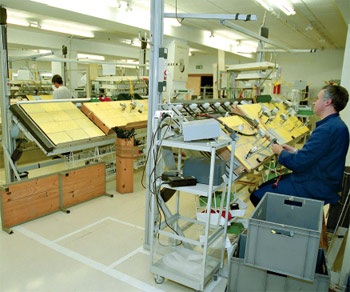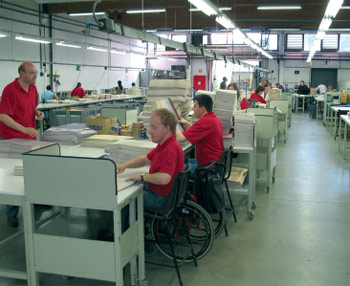Disability pension? No, thanks!
There is 5,5 million disabled living in Poland. As many as 84% of them depend entirely on the benefit. Only 8% of them earn their living. The Polish pension system and the fear of the adult life discourage them from going to work.

Fot. P. Stanisławski
It's me who decides about my earnings – not ZUS!
Andrzej always loved speed and motorcycles. Whenever someone
called him an „organ donor” he just laughed. He stopped laughing
three years ago. A late evening ride on a foggy day left him with a
broken spine, quadriplegia... and new occupational achievements. He
has never been on a pension.
Andrzej wakes up at 6.30. When Teresa, his guardian angel who helps him with the buttoning and does his shopping, comes at 7.30, he already has his day's schedule drawn up. There was another angel, once, but now Andrzej is on his own. He calls a taxi adapted for transporting people on wheelchairs. If he's lucky, it will be here in 20 to 30 minutes. If not, it may take even an hour to arrive. He's rarely lucky. Two „wheelchair weightlifters” carry him down from the second floor and into the car. His boss points meaningfully to his watch: „9.30. You're late”. Then it's meetings with clients, searching for data, typing it into the computer. He has his lunch at the company's canteen. While he's eating, he feels eyes watching him. The new girl at the reception desk is clearly sympathetic. Agata from the accountancy is giving him the eye. His colleagues from his department have just learned that they have to go on a business trip at the weekend. They avert their eyes as if they wanted to say: „Here we go again, doing all the work for him...” Andrzej finishes work at 18.00. If the taxi is not late, he's home at 19.00. There he finds his refrigerator full, his dinner ready and his flat spotlessly clean. He has a chat with his physiotherapist who tries to beat some life into his atrophied muscles. He finishes his report, eats his dinner and listens to his friend's account of the last match of his favourite football team on the phone. Then he goes to bed.
- My salary? Obviously, it's more than the pension... – says Andrzej bitterly – Sure, after the accident I could have let my flat and move to my parents and be as snug as a bug in a rug. But here I am, getting up at daybreak, letting strangers carry me around on my wheelchair, putting up with a boss who doesn't like me and working with people who are slowly loosing their patience with me. Why do I bother? Because, as Julian Tuwim once said: „the courage of life is to come up to a boxer and to tell him to go to hell”. Many people prefer to do it... on the phone. They say that they are simply being cautious. But I know that there is one thing that can paralyse better than the broken spine – it's fear. If they only dared to face this boxer, to – if they only can – give up their pension, to find a job and to earn more than the government gives them.
Anita Siemaszko, a lawyer advising people with disabilities, is
not in the least surprised that they are not willing to work. In
her opinion, the Polish pension system discourages them to.
„Getting the pension is an ordeal” - she explains. - Once you've
been pronounced incapable of work and providing that you completed
the required contributory and non-contributory period, all you can
hope for is a mere few hundred zloty a month. The ugly truth is
that for many families it is the only source of income and they
regard the disability as a smile of fortune. You wish to combine
pension with work? You're free to do so. But should you earn too
much, ZUS may reduce your pension or even suspend it. On top of it
all, even the ZUS employees admit that the regulations concerning
the reduction and suspension of pension are unclear and we
constantly receive complaints about their adverse decisions. It's
little wonder that most pensioners are reluctant to renounce their
pension and to go to work. The verification process is another
story. Even if you've been pronounced completely and permanently
incapable of work, ZUS can at any moment call you for another
examination, during which a different evaluating doctor will heal
you miraculously and will take the pension away, even though your
condition hasn't improved a bit. He might simply come to a
conclusion that the work you've been doing lately is, in his
opinion, similar to the one you had been considered unable to do
when the pension was awarded. You might have the chance to keep it,
providing that you work in the sheltered workshop. It is said that
ZUS is not very keen on the open labour market, claiming that the
disabled should work on the sheltered labour market. Since you've
managed to find a job outside it, you're obviously fit for any kind
of work and you no longer need the pension.
- Plus, there's the instability of the labour market and the
widespread belief that the disabled are provided for by the state
and thus don't need to work. Those who manage to find an employment
are often accused of „stealing” jobs from those who really need
them. All things considered, it comes as no surprise that pension
in Poland is a thing most treasured and nobody is willing to
relinquish it.
Know thy enemy

Fot. P. Stanisławski
- It's not only the fear of loosing one's pension. It's the fear of
assuming the responsibility for yourself and for your family –
explains psychologist Dorota Krawczyk. - Work is a test of life. It
means leaving the safe confinement of your home and meeting people,
establishing and cultivating relations with them, verifying your
knowledge and skills and sometimes becoming disappointed with them.
If you make a mistake there will be no one to comfort you, but you
will be criticised and expected to improve.
- Moreover, you need to get up every day at a specified time, get
to the office, find someone to look after the children. And what
about your leisure time? You may find that work is not such a great
thing after all. So the question arises: Isn't it more trouble than
it's worth? Maybe I'd better stay in the cosy confinement of my
home and try to get by on a pension, as meagre as it may be.
It's not the best solution – warns Dorota Krawczyk – By staying at
home you miss the opportunity to satisfy your basic needs. The
working environment is a bridge between your private sphere and the
outside world. Your performance at work is a measure of your worth.
It allows you to assert yourself, to gain respect and recognition
as a mature and independent individual. It gives you the sense of
belonging to a group and compels you to better organise your time
and space, to take full control of your life. You become more
mobile and flexible in your decisions. Work is an opportunity to
excel, to face new challenges, to realize your potential and to
boost your self-esteem. Stable job and higher income also allow you
to raise your living standard and to pursue your hobbies.
Furthermore, it appears that when you are idle (for example when
you don't work) your body shifts into a lower gear, it slows down
and becomes more prone to illness.
...Andrzej wakes up at 6.30. He recalls yesterday's fight
with his boss and decides to start looking for another job, not
necessarily in market research. Even, if it means taking some
occupational training. But first, he'll go on a holiday, somewhere
warm... Where does he get the money?
– From working my fingers to the bone – he laughs – Why?
'Cause I want to live, woman...
We asked ZUS

Przemysław Przybylski, ZUS spokesman:
- ZUS is an executive body and therefore obliged to follow the
rules to the letter. We are not „making things up”. According to
the general rule stated in the bill, a pension is awarded for a
maximum period of five years after which time the pensioner has to
reapply. ZUS is also obliged to evaluate the pensioner's earning
capacity. If the evaluation proves positive, ZUS is entitled to
suspend the pension. The regulations are also very clear on the
issue of combining pensions with work. I repeat – we are not trying
to curb the number of pensioners, we are simply observing the
law.
Combining pension with work
Disability pension:
- in the case of monthly income equal to less than 70% of average monthly earning the pension is payable in full amount
- from 70% to 130% of average monthly earnings - the benefit is reduced by such amount, by which the received income exceeds 70% of average monthly earning, however not more than by an amount of maximum reduction fixed for a given kind of benefit
- more than 130% - the payment of the benefit is suspended
Social pension:
- less than 30% of average monthly earning
Information about current average monthly payment can be found at: www.gus.pl and www.zus.pl.
***
Artykuł powstał w ramach projektu "Integracja
- Praca. Wydawnicza kampania informacyjno-promocyjna"
współfinansowanego z Europejskiego Funduszu Społecznego w ramach
Sektorowego Programu Operacyjnego Rozwój Zasobów Ludzkich.
Komentarze
brak komentarzy
Polecamy
Co nowego
- Ze wsparciem samej Ewy Pajor. Polki otworzą pierwsze w historii MŚ w ampfutbolu!
- Jesień pod znakiem profilaktyki
- Głos nauczycielski: MEN planuje zmianę sposobu finansowania uczniów z niepełnosprawnościami
- „Ubezwłasnowolnienie i DPS to byłaby dla mnie masakra”
- Rusza głosowanie na najlepszego i najpopularniejszego sportowca 2024 roku – tegoroczne #Guttmanny nadchodzą





Dodaj komentarz